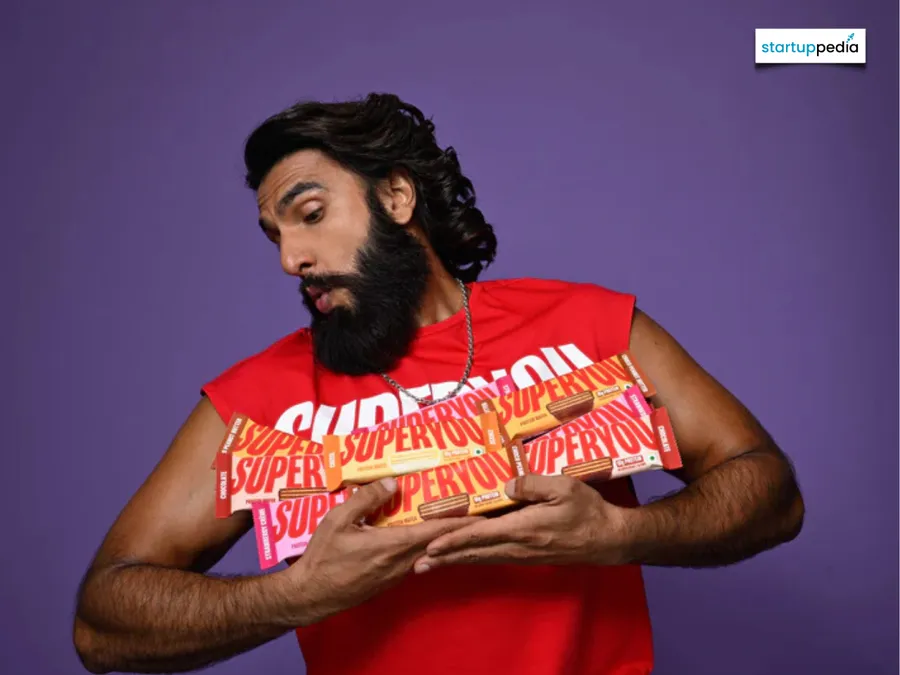Copyright startuppedia

"Ranveer Singh"s new business, SuperYou, has quickly become a big name in India"s snack market. Advertisment The protein wafer brand started in November 2024 and reached an annual run rate of ₹100 crore in just six months, even though it sells only four products. The brand"s clean look, fun ads, and Ranveer"s strong involvement helped it grow faster than most new food companies in India. How Ranveer Singh"s SuperYou reached ₹100 crore in 6 months SuperYou was founded in 2024 by Nikunj Biyani and Ranveer Singh. Their goal was simple: to make snacks with more protein that still taste great. Nikunj says the idea came to him while playing basketball. He sent Ranveer a few funny GIFs to share the idea, without any slides or formal pitch. “At some odd hour in the morning, he said, "I love it, I love it, I love it,"” Nikunj recalls. Nikunj comes from a family that knows Indian retail inside out. His uncle, Kishore Biyani, is the founder of the Future Group, which built well-known brands like Big Bazaar and Foodhall. And Ranveer is more than just a brand face. “He"s a real partner. Every product goes through his family"s taste test,” says Nikunj. This personal effort helped SuperYou build trust with buyers from the very beginning. Also Read: Peyush Bansal"s son records video using Lenskart"s UPI-integrated B Camera Smartglasses; Founder says, “The future"s getting ready” Rapid Growth of SuperYou: Key Numbers and Strategy In only six months, SuperYou reached a rare milestone for a new Indian food company. It started with only four SKUs, mainly protein wafer bars in flavors like Chocolate, Choco Peanut Butter, Strawberry Crème, and Cheese. This level of growth is uncommon in India"s wellness food space, especially for a startup with such a small product range. Here"s what worked in SuperYou"s favor: Clear product-market fit: India has long been a protein-deficient country, and SuperYou entered the market right when awareness about daily protein intake was rising. Strong backing and real involvement: Ranveer Singh is not just the face of the brand. As Nikunj Biyani said, “He"s a real partner. Every product goes through his family"s taste test.” Smart packaging and positioning: The colorful and premium packaging makes SuperYou"s wafers look fun and indulgent, not like a typical health snack. Modern distribution channels: The brand focused on quick commerce, D2C, and modern retail, using Blinkit and Swiggy Instamart to reach customers faster. Focused marketing and storytelling: With only four products, SuperYou could invest in bold, creative campaigns that connected well with young, health-conscious consumers. These focused strategies helped SuperYou grow from launch to ₹100 crore in just half a year — a milestone few new food brands have ever achieved in India. Also Read: Starlink makes India debut as Maharashtra becomes 1st state to partner with Elon Musk's satcom firm Why SuperYou clicked with Indian consumers SuperYou entered the market when people wanted snacks that were both tasty and healthy. Most Indians were used to chocolates or fried snacks but were ready for better options. Its protein wafers, with 10 grams of protein and no added sugar, filled that gap. They taste indulgent yet healthy, and the new protein chips became an instant hit among young buyers. The bright packaging and fun branding made the products stand out online and in stores. By focusing on quick commerce through Blinkit, Zepto, and Swiggy Instamart, SuperYou reached customers fast. A mix of good taste, strong design, and easy availability helped it win over consumers in record time. Also Read: Zepto to file IPO papers this month, eyes $450-500 million fundraise: Report SuperYou"s next goal: ₹500 crore in five years After reaching ₹100 crore in just six months, SuperYou has set a new goal. The company now aims to achieve ₹500 crore in revenue within five years, according to co-founder Nikunj Biyani. SuperYou may still be young, but it has already proved that India"s next wave of food brands will be built on honest products, smart distribution, and a deep understanding of what customers actually want. Also Read: "VCs are playing a tax arbitrage game," says Nithin Kamath; Ashneer Grover replies, "Then would Zerodha or any broker still be in business?”"



